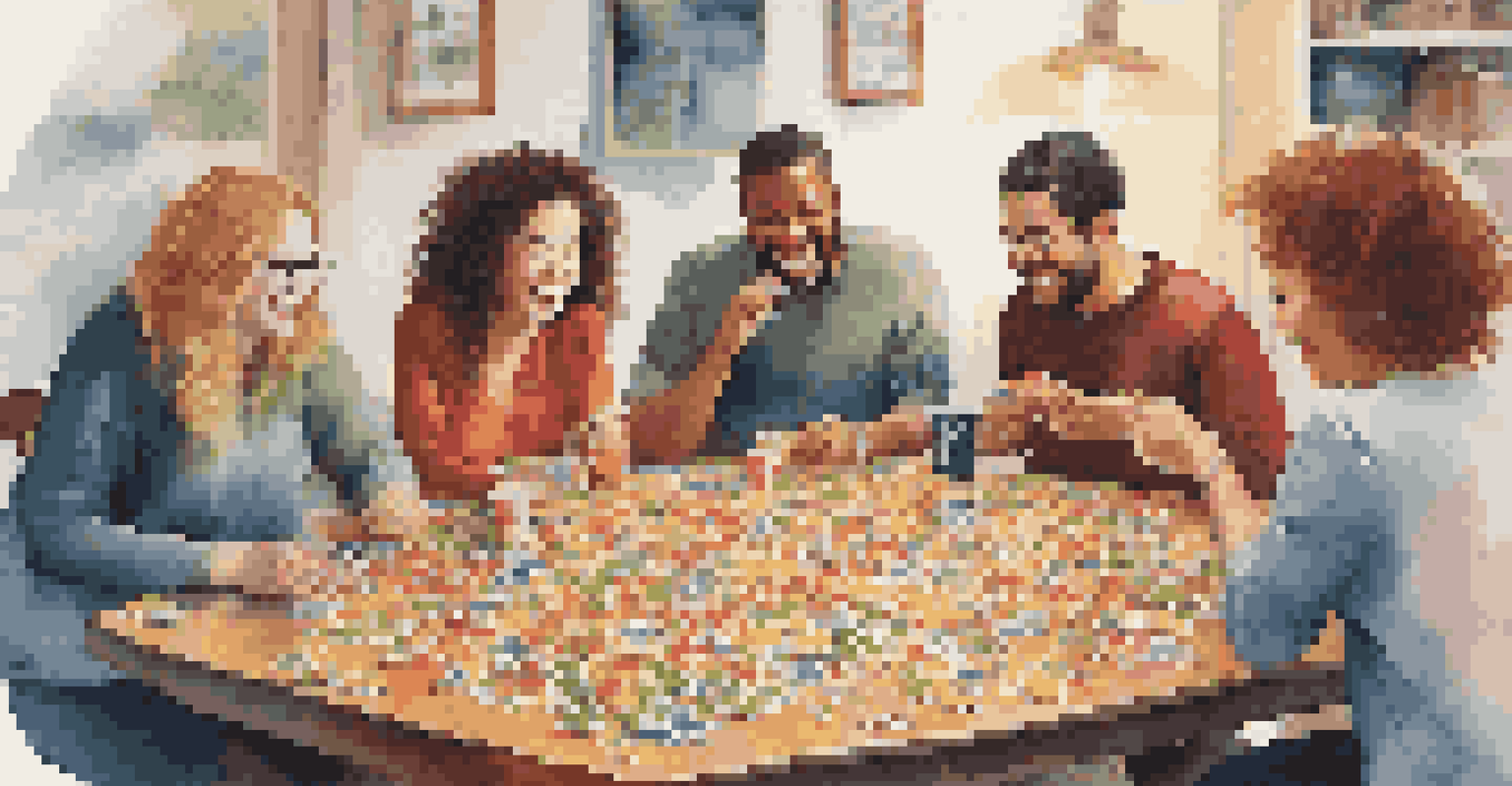How to Stay Motivated When Solving Difficult Puzzles

Understanding the Challenge of Difficult Puzzles
Difficult puzzles can often feel overwhelming, like facing a mountain that seems too steep to climb. When you sit down to solve one, it's easy to get discouraged if the pieces don't seem to fit or if the solution remains elusive. However, understanding that difficulty is part of the process can help shift your mindset from frustration to curiosity.
The journey of a thousand miles begins with one step.
Consider approaching puzzles like a detective on a case, where each clue brings you closer to the solution. This perspective not only makes the challenge more engaging but also helps you embrace the struggle as part of the journey. By reframing your thoughts, you can find joy in the process rather than solely focusing on the outcome.
Remember, every puzzler faces challenges, and it’s perfectly normal to hit a wall. Recognizing this shared experience can foster a sense of community and motivation, reminding you that perseverance is key in overcoming obstacles.
Set Realistic Goals to Maintain Focus
When tackling a tough puzzle, it's beneficial to break it down into smaller, manageable goals. Instead of aiming to complete the entire puzzle in one sitting, set a goal to finish a specific section or gather a certain number of pieces. This approach keeps your motivation high as you celebrate small victories along the way.

For instance, if you're working on a jigsaw puzzle, you might aim to sort all the edge pieces first. This not only gives you a clear target but also provides a sense of accomplishment as you see progress. Each small goal achieved can boost your confidence and propel you forward.
Shift Your Mindset on Challenges
Embrace the struggle of difficult puzzles as a part of the journey, transforming frustration into curiosity.
Establishing these smaller milestones also helps to reduce feelings of being overwhelmed. By focusing on one piece at a time, you’ll find it easier to stay engaged and motivated throughout the puzzle-solving experience.
Create a Comfortable and Inspiring Workspace
The environment where you tackle your puzzles can significantly affect your motivation. Creating a cozy and inspiring workspace can make the experience more enjoyable and encourage you to spend more time solving. Think of it as setting the stage for your puzzle-solving adventure.
Success is the sum of small efforts, repeated day in and day out.
Consider adding comfortable seating, good lighting, and perhaps some calming music or a favorite drink nearby. This little atmosphere can lead to a more pleasant experience, allowing you to immerse yourself fully in the puzzle. It’s similar to how an artist feels inspired in a well-decorated studio.
Additionally, having all your puzzle pieces organized and easily accessible can minimize distractions and keep you focused. A tidy workspace reflects a clear mind, making it easier to dive into the challenge without unnecessary interruptions.
Take Breaks to Refresh Your Mindset
When you're stuck on a particularly challenging puzzle, taking a break can be a game changer. Just like athletes need rest to perform their best, your brain also benefits from stepping away for a while. A short walk, stretching, or even a quick snack can help reset your focus and bring fresh energy to the task.
During these breaks, allow your mind to wander or think about something entirely different. Often, solutions come when you’re not actively trying to solve the problem. This can be compared to letting a pot of water boil without constantly stirring it; sometimes, the best ideas surface when you step back.
Set Small Goals for Progress
Breaking down puzzles into manageable tasks helps maintain motivation and reduces feelings of overwhelm.
When you return to your puzzle after a break, you may find that you can see connections you previously overlooked. This renewed perspective can reignite your motivation and help you push through the toughest parts of the puzzle.
Connect with Others Who Share Your Passion
Engaging with a community of fellow puzzle enthusiasts can significantly boost your motivation. Whether it’s joining a local puzzle club or participating in online forums, sharing your experiences with others can provide support and inspiration. It’s like having a team cheering you on during a challenging game.
You can exchange tips, celebrate each other’s successes, and even tackle puzzles together. The camaraderie can make the process less isolating and more enjoyable. Plus, sharing your struggles can help you realize that everyone faces challenges, which is part of the fun.
Consider hosting puzzle nights with friends or family where everyone can bring a puzzle to work on together. This social aspect not only keeps you motivated but also transforms puzzle-solving into a shared experience filled with laughter and teamwork.
Celebrate Your Progress, No Matter How Small
Celebrating your progress, no matter how small, is crucial for maintaining motivation. Each piece you place or section you complete deserves recognition. This practice reinforces a positive mindset and encourages you to keep going, even when faced with difficult challenges.
For example, treat yourself to a small reward after completing a significant milestone, like finishing a corner of a jigsaw puzzle. It could be as simple as enjoying a favorite snack or taking a moment to share your progress with friends. Recognizing these achievements keeps the momentum going.
Celebrate Every Small Victory
Recognizing and rewarding your progress, no matter how minor, fosters a positive mindset and encourages continued effort.
This habit can also transform your approach to challenges. Instead of solely focusing on the final goal, you learn to appreciate the journey and the skills you’re developing along the way. By celebrating your efforts, you create a more enjoyable puzzle-solving experience.
Embrace the Learning Experience
Every difficult puzzle presents an opportunity for growth and learning, even if it doesn’t feel that way initially. When you struggle with a particular aspect, take a moment to reflect on what you can learn from the experience. This mindset shift can turn frustration into curiosity.
For example, if you find yourself repeatedly stuck on a type of puzzle, consider researching strategies or techniques that can help you improve. There are countless resources available, from books to online tutorials, that can provide insights into different approaches. Just like mastering any skill, the journey involves learning from mistakes.

Embracing this learning aspect not only keeps your motivation high but also enhances your puzzle-solving abilities over time. As you grow more skilled, you’ll find that tackling difficult puzzles becomes less daunting, making the entire process more rewarding.